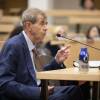Boston’s preliminary election is just around the corner, and the city is set to make history: Each major mayoral candidate is a person of color, and four out of five are women. Political observers are keeping a close eye on the Latino community, a growing force in local and statewide elections.
“With voter turnout being as low as we see [in] mayor’s races in Boston, the Latino community can really become a deciding factor in this race,” said Malia Lazu, a lecturer at the MIT Sloan School of Management and founder of Mass VOTE, on Morning Edition Wednesday. “Latinos have a history of coming together and electing people that will serve their community. And I think this race will be another example of that.”
Host Aaron Schachter noted that, in 2020, Latino residents in Massachusetts surpassed Black voters as the second largest voting group after white voters, according to an analysis by the Gastón Institute for Latino Community Development and Public Policy at UMass Boston.
The Latino community in Massachusetts is diverse, made up of voters with backgrounds from dozens of countries and has a history rooted in civic activism, Lazu said.
“In those countries, many of them either had to fight for the right to vote, or were very active in their civic life,” she said, referring especially to high voter turnout in Puerto Rico.
However, she emphasized that Latino voters are not a monolith.
“I think it's also important to remember, as an Afro Latina, that an expanding Latino community also means an expanding Black voter bloc,” Lazu said. “Whether it’s Puerto Ricans, Dominicans, Colombians, Venezuelans — there are Black people within the Latino community and they, too, will be voting.”
"The Latino community can really become a deciding factor in this race."-Malia Lazu
The Latino community was among the hardest hit by COVID-19, meaning that making voting accessible to those communities is more important than ever, according to Lazu. She called for the city to ensure an “equitable election” with reforms like same-day registration, making election day a national holiday, more public financing for elections and more voter campaigns to make voters aware of election deadlines and to make voters feel more welcome at polling stations.
Outside of Boston, Lazu said there are many Latinos in “gateway cities,” with growing economies, that could be a powerful force in statewide elections. Cities like Worcester, New Bedford, Brockton, Lynn, Lawrence, Lowell and communities in western Massachusetts like Springfield, for example, have been electing more Latinos in recent elections. And that could continue to grow.
“With Sonia Chang-Díaz running [for governor], that's going to be interesting to see: Is she a catalyst for this vote?” Lazu said.
But more importantly, Lazu said, local elections are where Latinos are “having their say” on impacting policy and shrinking the wealth gap.
“If these small cities and these gateway cities start with equity because of who is elected, they'll be in a much better place to have a diverse economy versus what we're trying to fix here in Boston,” she said.







